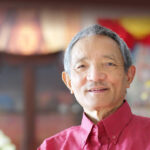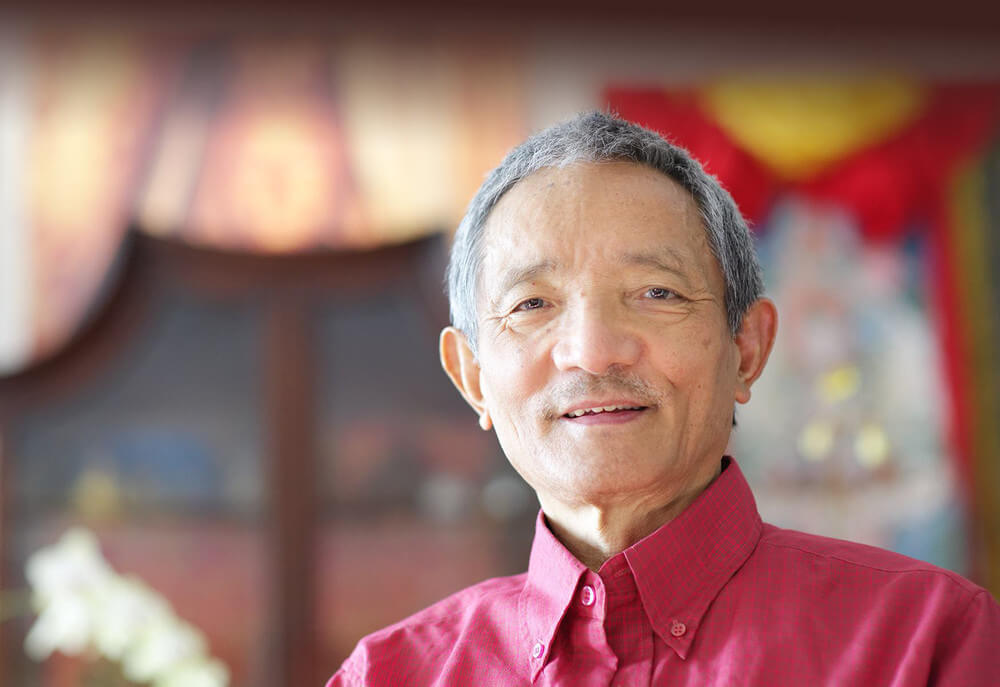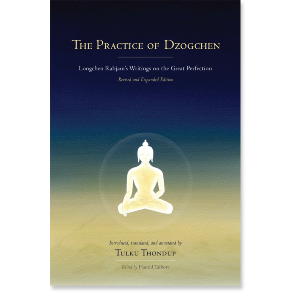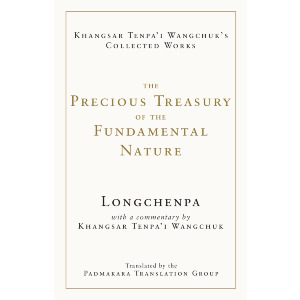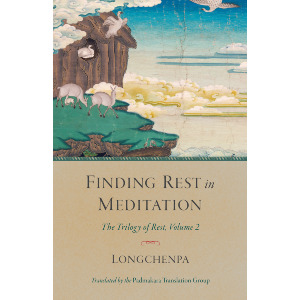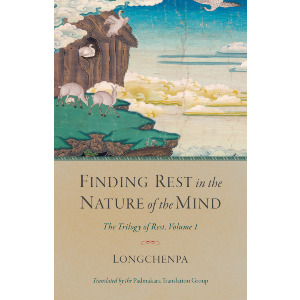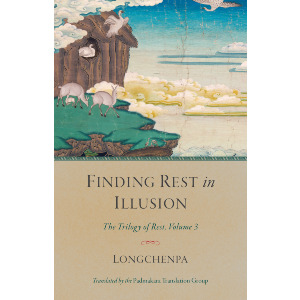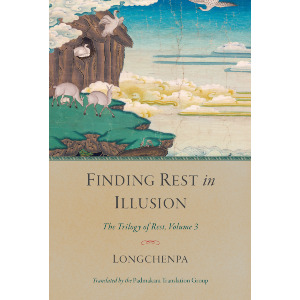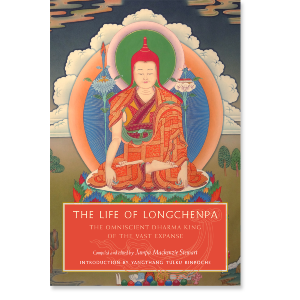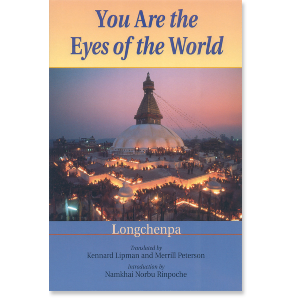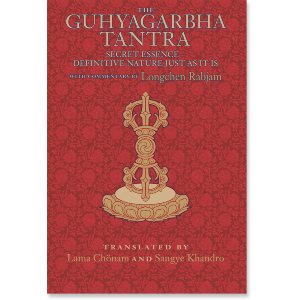| The following article is from the Winter, 1996 issue of the Snow Lion Newsletter and is for historical reference only. You can see this in context of the original newsletter here. |
by Longchen Rapjampa Introduced, trans, and annotated by Tulku Thondup Rinpoche Ed. by Harold Talbott
482 pp. ISBN 1-55939-054-9 $22.95
The following is excerpted from the translator's preface to The Practice of Dzogchen.
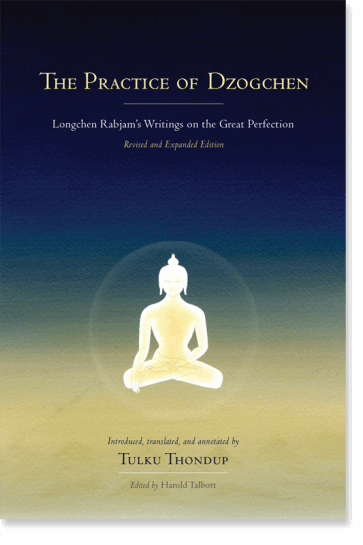
Dzogpa Chenpo meditation is the method of training of utmost simplicity in order to reach the most simple state free from conceptual elaborations. But for ordinary people like us, to attain the state of utmost simplicity and ease is the hardest goal to accomplish. Thus, to prepare for the Dzogpa Chenpo training, one has to do various preliminary studies and train ing in order to learn the path and purify the stains of negative emotions with their traces; to generate positive energy through the force of virtues; and to realize, refine and perfect the ordinary meditative attainments taught in the common Buddhist paths. When one is ready, in accordance with the strength of one's spiritual experiences, one should be instructed in the Dzogpa Chenpo meditation by a qualified master.
For the happiness and enlightenment of beings, Buddhism works with the root, the root of gaining joy and dispelling misery, which lies in individuals; for society is a collection of individuals. For an individual, the mind is the main factor and the forerunner of all activities. So the improvement and perfection of the mental state is the primary emphasis of Buddhist training. If one has improved and perfected one's mind, all one's physical activities will be naturally perfect and one's presence and activities will become a source of true happiness and enlightenment for others. From the moment of becoming a Mahayana Buddhist, one is expected to exert oneself in the service of others. The whole aspiration in spiritual training is for the sake of others. But at the beginning, the emphasis will be on the spiritual progress of oneself, deriving from one's own mind. Without spiritual strength within oneself, trying to serve others will be as a Tibetan proverb says: A falling person cannot give his shoulder to another falling person to rely on.

Without spiritual strength within oneself, trying to serve others will be as a Tibetan proverb says: A falling person cannot give his shoulder to another falling person to rely on.
The meditations of tantra and of Dzogpa Chenpo taught and transmitted by Guru Padmasambhava are a training on the balanced path of the view of primordial wisdom and the activities of meritorious applications. They are neither a contemplation on mere view, although some interpret them thus, nor training on just meritorious activities. Guru Padmasambhava said to King Thrisong Deutsen (790-858):
Please do not lose the view in favor of activities. If you do, being tied to existential characteristics, you will not attain liberation. Please do not lose activities in favor of the view. If you do, there arises (a situation of) absence of both virtues and vices (and one falls into the extreme of) nihilism, and (one's spiritual life) becomes irreparable. 0 great king, as my tantras possess extensive (teach ings on) view, in the future many people who know the words [textual expression] of the view but lack the confidence of the view in their mental continuum could stray into inferior realms
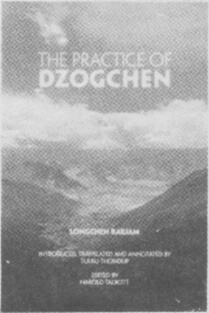
The cover of an earlier edition and what is in the newsletter
In Dzogpa Chenpo meditation itself there are numerous stages of training which must be taught and practiced step by step. Each step is taken only when the trainee is ready for it. In Dzogpa Chenpo, a subtle and esoteric meditation which transcends intellectual and mental fabrications, one doesn't study or read the teachings on a particular aspect until one is ready for that particular step of experience and for training on it. And one is definitely excluded from instructions on experiential meditation (Nyams-Khrid or dMar-Khrid). If, without being ready for the particular meditative experiences, one reads about or studies them, one could just build up fabricated images of intellectual understanding about a particular meditative experience. Thereby, before having any true experience or pure realization, one could fall into the pit of mental creations. Then the trainee will find it hard even to distinguish whether it is a true experience of realization or a mentally created image. This way of introduction applies not only to Dzogpa Chenpo, but also to general tantric training. In sutric teaching, first you study and then enter into the training. But in the tantras, when you have matured through the common preparatory virtues and are ready for the esoteric training, you will receive the transmission of the realization through an Empowerment (dBang, S.abhisekha) ceremony. Only then will you be introduced to the course of study and training in the tantra by using the Primordial Wisdom, the meaning of the empowerment (dBang-Don Gyi Ye-Shes), which is realized during the transmission of empowerment, as the means and the basis of meditation. Some people do not need to undergo any common training but are ready for higher training such as Dzogpa Chenpo. But such people are a bare possibility in this world of ours.
Therefore, in this book I have tried to avoid including any instructions on the stages of experiential meditation, since one should get them individually from a true master in person, stage by stage, according to one's own experiential abilities. I have tried to present here only, or at least mainly, the teachings on view, the outline of the meditation, and the result of Dzogpa Chenpo.
Nowadays, as the cultural context of the traditional teachings is changing, the tantric teachings and even the Dzogpa Chenpo teachings are being given in public to many people who may have little belief, who have done no preliminary train ing or have received no introductory empowerments. The main focus of attraction and the goal of many so-called masters and disciples unfortunately have become worldly or sensual attributes. On the other hand, there are many serious Dharma people who wish to study Dzogpa Chenpo teachings out of pure Dharma interest, and who are prepared for such teachings through preliminary study and training. But the lack of instruction and reading material in Western languages is preventing them from making much progress on this path. In this situation, it is a serious decision whether or not to write and translate such teachings and make them public. Realistically, in this modern age, there is no way that these teachings could be preserved and practiced traditionally only by those who are ready for them. So the alternative is to consider what will be the best possible way to present the teachings to the public so that they will be of most benefit to the people whom they will reach.
After all these considerations, I reached the conclusion that I would attempt to translate and present these original scriptures, the very words which came from the wisdom of the Enlightened Ones, unstained by the contemporary intellectual thought of this modernistic world or ours. ä_æ

